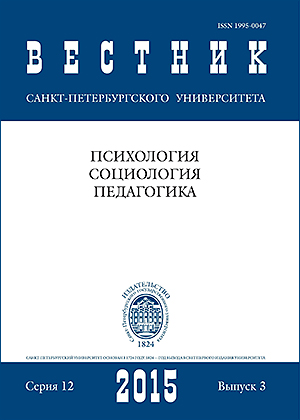HYPOXIA INFLUENCE ON THE MENTAL WORKING CAPACITY OF OPERATORS WHO USED DIFFERENT STRATEGIES OF INFORMATION PROCESSING IN A WORKING MEMORY SYSTEM
Abstract
Male participants were asked to carry out intensive mental activity inclusive spatial and verbal information
processing: (1) in normal gas environment conditions, (2) during 4–6 minutes of hypoxic gas mixture inhalation (oxygen content in the inhaled air was 12%) and (3) during 12–14 minutes of hypoxic load. A progressive decrease of working capacity was found in these conditions. Moreover, working capacity decrease was characterized by time increasing at the beginning of the hypoxic load, and also wrong answers number having increased at the end of the hypoxic load. The study shows that in case of hypoxic factor influence, working capacity indices decreasing was significantly less among participants who used “complex” strategy of information processing as compared with individuals who used the “verbal” strategy. The study results reveals that cognitive strategies inclusive increasing number of functional links in a system of information processing are less effective in hypoxic hypoxia conditions. Refs 14. Figs 2.
Keywords:
hypoxia, mental working capacity, working memory, cognitive performance, information processing
Downloads
References
References
Downloads
Published
How to Cite
Issue
Section
License
Articles of "Vestnik of Saint Petersburg University. Sociology" are open access distributed under the terms of the License Agreement with Saint Petersburg State University, which permits to the authors unrestricted distribution and self-archiving free of charge.




